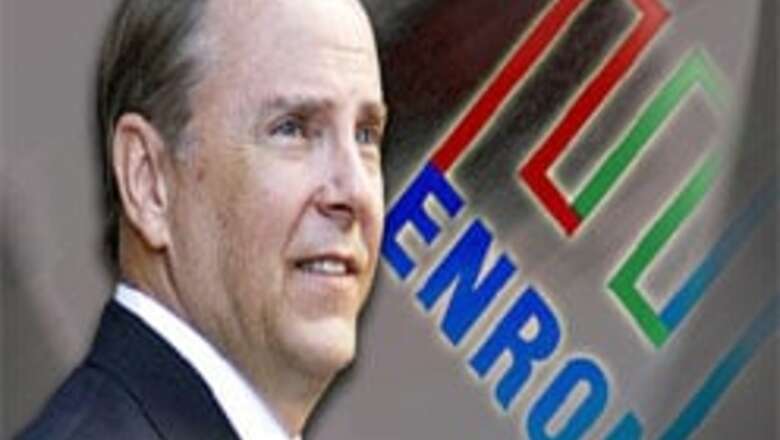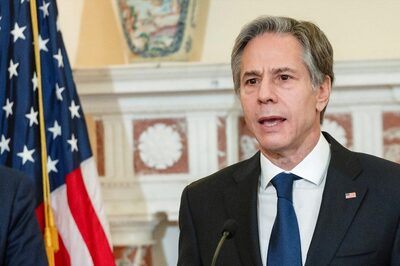
views
Houston: Former Enron CEO Jeffrey Skilling was ordered to serve 24 years and four months in prison, the harshest punishment by far in Enron's scandalous collapse and one that capped a string of tough sentences for top executives in corruption cases.
US District Judge Sim Lake, on Monday, denied Skilling's request for bond and ordered him to home confinement, wearing an ankle monitor.
Lake, who told the US Bureau of Prisons to recommend when Skilling should report to prison, suggested the 52-year-old be sent to the federal facility in Butner, North Carolina, for his role in a case that came to symbolise corporate fraud in America.
''His crimes have imposed on hundreds if not thousands a life sentence of poverty,'' Lake said.
The former chief executive officer will be eligible to shave up to 54 days a year off his sentence for good behavior in prison. Lake also ordered Skilling to undergo alcohol and mental-health counseling. A successful completion of that treatment would take a year off his sentence.
Skilling, insisting he was innocent yet remorseful in a two-hour hearing, was the last top former official to be punished for the accounting tricks and shady business deals that led to the loss of thousands of jobs, more than $60 billion in Enron stock and more than $2 billion in employee pension plans after the company imploded in 2001.
His remaining assets, about $60 million, will be liquidated, according to an agreement among lawyers for Enron employees, the company's savings and stock ownership plans, prosecutors and Skilling's legal team.
About $45 million will be put in a restitution fund for victims. The remaining $15 million will go to Skilling's legal fees, said Lynn Sark, attorney for the Enron Corp. Savings Plan and Stock Ownership Plan.
The Justice Department allowed Skilling to set aside $23 million for his defense when he was indicted; he still owed his lawyers $30 million (23.89 million) as of Monday.
Outside the courthouse, Skilling vowed to appeal his sentence and also asked that his restitution money go straight to victims, instead of being seized first by the federal government. His attorney, Daniel Petrocelli, said the restitution will be held until all of Skilling's appeals are exhausted.
Skilling had stood with his hands clasped below his waist, with Petrocelli at his side while being sentenced. He gave no visible reaction. After court adjourned, Skilling hugged Petrocelli.
Skilling's term is the longest received by any Enron defendant; former Chief Financial Officer Andrew Fastow was given a six-year term after cooperating with prosecutors and helping them secure Skilling's conviction.
It falls just shy of the sentence imposed on WorldCom CEO Bernard Ebbers, who received 25 years for his role in the $11 billion accounting fraud that toppled the company he built from a tiny telecommunications firm to an industry giant. Another CEO, Dennis Kozlowski of Tyco International Ltd, received a sentence of eight and one-third to 25 years in prison in another fraud case.
Skilling's co-defendant, Enron founder Kenneth Lay, died from heart disease on July 5. Lay's convictions on 10 counts of fraud, conspiracy and lying to banks in two separate cases were wiped out with his death.
Skilling's arrogance, belligerence and lack of contriteness under questioning made him a lightning rod for the rage generated after Enron sought bankruptcy protection in 2001. Lay was once a leading city father whose charitable good works and affable nature endeared him locally. Skilling was little known outside Enron until his anger at being caught brought his personality into public focus.
''Your honor, I am innocent of these charges,'' Skilling told Lake on Monday. ''I'm innocent of every one of these charges."
''We will continue to pursue my constitutional rights and it's no dishonor to this court and anyone else in this court. But I feel very strongly about this, and I want my friends, my family to know that.''
PAGE_BREAK
Skilling also disputed reports that he had no remorse for his role in the fraud that drove the company to seek bankruptcy protection.
''I can tell you that's just the furthest thing from the truth,'' he said. ''It's been very hard on me, but probably, more important, incredibly hard on my family, incredibly hard on employees of Enron Corp., incredibly hard on my friends and incredibly hard on the community.
''And I want my friends, my family to know this.''
Skilling's second wife, former Enron corporate secretary Rebecca Carter, was in the courtroom.
Skilling's apologetic tone did not last long.
Outside the courtroom later, he predicted he will be vindicated on appeal.
''The word 'Enron' conjures up some really awful things,'' he said. ''I don't fault the judge for what he did. I believe I'll be vindicated.''
Skilling said he never considered striking a deal with prosecutors because he believed he had done nothing wrong.
Skilling was convicted in May on 19 counts of fraud, conspiracy, insider trading and lying to auditors. He was acquitted on nine counts of insider trading.
On Monday, Lake set investor loss tied to his actions at $80 million, which he relied on to set the sentence. With that figure, Skilling faced up to 30.4 years in prison.
Skilling also faces more than $18 million in fines for his crimes.
Victims unleashed nearly five years of anger on Skilling Monday and begged Lake to send Skilling to prison for life.
''Mr Skilling has proven to be a liar, a thief and a drunk, flaunting an attitude above the law,'' said 22-year Enron employee Dawn Powers Martin. ''He has betrayed everyone who has trusted him. Shame on me for believing the management of Enron.''
Two chose not to vilify Skilling, however.
''I can't state strongly enough, during 20 years, have I seen or heard anything that he was leading a massive conspiracy to mislead Enron shareholders and employees,'' said one of them, Sherri Sera, a former administrative assistant. She said she too had lost thousands in Enron stock and benefits but took blame for her own failure to diversify.
Former employee Diana Peters later called the sentence ''just'' but added, ''I am extremely disappointed he wasn't taken into custody today.''
''The people who have been harmed by the bankruptcy have very strong feelings about the subject,'' Petrocelli said. ''But that does not shed much light on the reasonableness of the sentence Mr. Skilling should receive.''
Jurors decided Skilling and Lay repeatedly lied about Enron's financial health when they knew of accounting maneuvers that hid debt and inflated profits.
Enron's crash and the subsequent scandals roiled Wall Street and prompted stiffened white collar penalties and upped regulatory scrutiny over publicly traded companies.
Skilling maintained his innocence before, during and even after his trial, insisting no fraud occurred at Enron other than that committed by a few executives skimming millions in secret side deals, and that bad press and poor market confidence combined to sink the company.
During his trial, Skilling listed his remaining assets as including a $5 million mansion in Houston, a $350,000 condo in Dallas, a Mercedes Benz, two Land Rovers and nearly $50 million in stocks and bonds frozen by the government.
Skilling, who was born in Pittsburgh and raised in New Jersey and suburban Chicago, spent 11 years at Enron. He has three children - aged 22, 20 and 16 - from his first marriage. He and Carter have no children.
He took over as chief executive from Lay in February 2001 but abruptly quit six months later, citing a desire to spend more time with his family. Prosecutors said he left Enron because he knew the company was on the brink of bankruptcy.
















Comments
0 comment